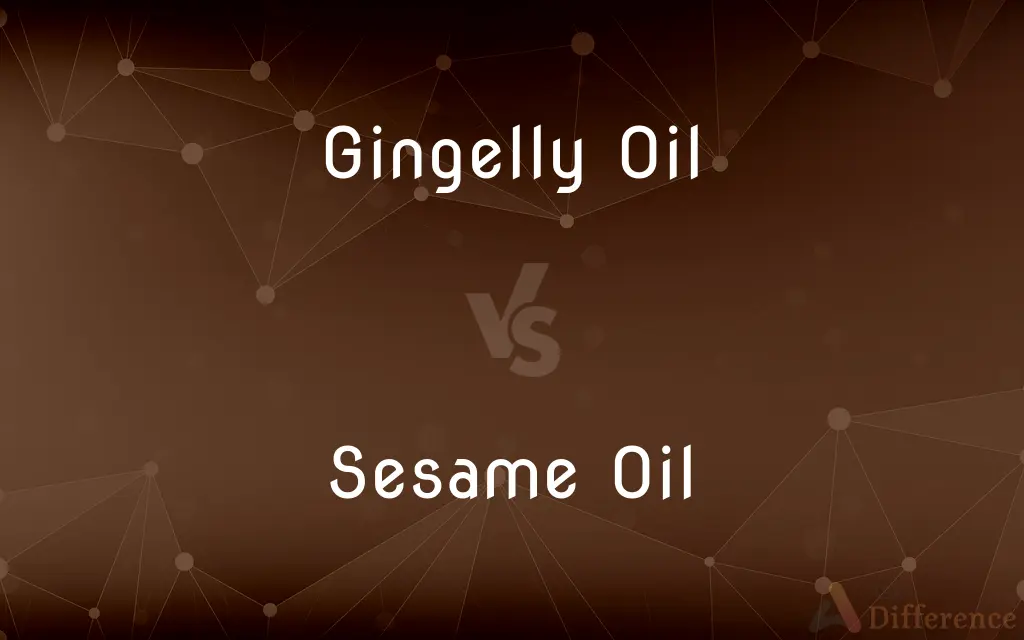Gingelly Oil vs. Sesame Oil — What's the Difference?
By Tayyaba Rehman — Published on January 5, 2024
Gingelly Oil, often synonymous with sesame oil, is specifically the unrefined, cold-pressed form of sesame oil. Sesame Oil generally refers to both unrefined (light, nutty) and refined (neutral taste, high smoke point) forms.

Difference Between Gingelly Oil and Sesame Oil
Table of Contents
ADVERTISEMENT
Key Differences
Gingelly Oil is a term commonly used in Indian cooking, referring specifically to sesame oil that is extracted through cold pressing the sesame seeds. This process retains the natural flavor, aroma, and nutritional content of the sesame seeds. Sesame Oil, in a broader context, encompasses both unrefined (cold-pressed) and refined varieties. The refined type is processed to have a neutral taste and a higher smoke point, suitable for high-heat cooking.
The unrefined version of Sesame Oil, which is similar to Gingelly Oil, has a light, nutty flavor and is often used as a flavor enhancer in various cuisines, particularly in Asian dishes. Refined sesame oil, which falls under the broader category of Sesame Oil, is more versatile for various types of cooking due to its neutral flavor and higher smoke point.
In terms of culinary use, Gingelly Oil is primarily used in traditional dishes where its distinct flavor is desired. It's often used in dressings, marinades, and to finish dishes. On the other hand, the refined type of Sesame Oil is more commonly used for frying, sautéing, and other high-heat cooking methods.
Nutritionally, both Gingelly Oil and Sesame Oil are rich in antioxidants and have health benefits including heart-healthy fats. However, Gingelly Oil, being unrefined, may retain more of its natural nutrients and antioxidants compared to the refined variety of sesame oil.
The choice between Gingelly Oil and Sesame Oil often depends on the cooking application and flavor preference. While they are essentially derived from the same source, their processing and culinary uses can differ significantly.
ADVERTISEMENT
Comparison Chart
Processing
Cold-pressed, unrefined.
Includes both unrefined and refined forms.
Flavor
Distinct, nutty flavor.
Nutty in unrefined form, neutral in refined form.
Culinary Use
Flavor enhancer in dressings, marinades.
Versatile, used in high-heat cooking in refined form.
Smoke Point
Lower smoke point due to being unrefined.
Higher smoke point in refined form.
Nutritional Content
Retains more natural nutrients and antioxidants.
Refined form may have fewer nutrients.
Compare with Definitions
Gingelly Oil
Less processed, with a distinct taste.
I prefer gingelly oil for its natural taste in cold dishes.
Sesame Oil
Refined variety has a high smoke point for cooking.
Used refined sesame oil for stir-frying vegetables.
Gingelly Oil
Cold-pressed, unrefined sesame oil.
I used gingelly oil for its rich flavor in the salad dressing.
Sesame Oil
Contains healthful fats and antioxidants.
Incorporated sesame oil in my diet for its health benefits.
Gingelly Oil
Often used for its health benefits.
Chose gingelly oil for its antioxidants in my diet.
Sesame Oil
Versatile in various cooking methods.
Sesame oil is my go-to for both sautéing and dressings.
Gingelly Oil
Retains natural sesame flavor and nutrients.
Gingelly oil added a nutty aroma to the dish.
Sesame Oil
Unrefined version adds a nutty flavor to dishes.
Drizzled unrefined sesame oil on the finished dish for extra flavor.
Gingelly Oil
Popular in traditional Indian and Asian cuisines.
Gingelly oil is a staple in my Indian cooking recipes.
Sesame Oil
Encompasses both refined and unrefined sesame oils.
I use sesame oil for both frying and flavoring.
Common Curiosities
What’s the main difference in taste between Gingelly and Sesame Oil?
Gingelly Oil has a richer, nuttier flavor, while refined Sesame Oil is more neutral.
Is refined Sesame Oil suitable for high-heat cooking?
Yes, its high smoke point makes it suitable for frying and sautéing.
What is Sesame Oil?
Oil extracted from sesame seeds, available in both refined and unrefined forms.
Can I use Gingelly Oil for frying?
It's better used for low-heat cooking due to its lower smoke point.
Can I use Sesame Oil instead of Gingelly Oil in recipes?
Yes, but expect a milder flavor with refined Sesame Oil.
Are there nutritional differences between Gingelly and Sesame Oil?
Gingelly Oil may retain more nutrients due to less processing.
What is Gingelly Oil?
It's cold-pressed, unrefined sesame oil with a distinct nutty flavor.
Is Gingelly Oil commonly used in Asian cooking?
Yes, particularly in Indian and some Asian cuisines.
Does Sesame Oil contain allergens?
Yes, it should be avoided by those allergic to sesame.
What are the health benefits of using Gingelly Oil?
It's rich in antioxidants and healthy fats.
Can I use Sesame Oil for both cooking and finishing dishes?
Yes, refined for cooking and unrefined for finishing.
Which oil is better for salad dressings?
Gingelly Oil is preferred for its rich flavor in dressings.
Should Gingelly Oil be refrigerated after opening?
It's not necessary but can extend its shelf life.
How long does Sesame Oil last once opened?
Refined Sesame Oil lasts longer, up to a year or more.
Is there a cost difference between Gingelly and Sesame Oil?
Gingelly Oil might be slightly more expensive due to less processing.
Share Your Discovery

Previous Comparison
MySQL vs. MySQLi
Next Comparison
Multimolecular Colloids vs. Macromolecular ColloidsAuthor Spotlight
Written by
Tayyaba RehmanTayyaba Rehman is a distinguished writer, currently serving as a primary contributor to askdifference.com. As a researcher in semantics and etymology, Tayyaba's passion for the complexity of languages and their distinctions has found a perfect home on the platform. Tayyaba delves into the intricacies of language, distinguishing between commonly confused words and phrases, thereby providing clarity for readers worldwide.















































